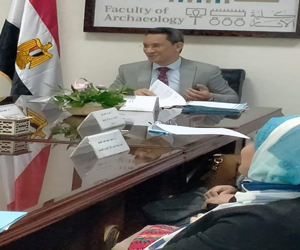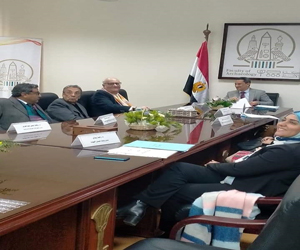The Faculty of Archeology holds the fifteenth council of the faculty
The Council of the Faculty of Archeology at Ain Shams University held its fifteenth monthly meeting in the faculty council hall headed by Prof. Hossam Tantawy, Dean of the Faculty, and in the presence of Prof. Ahmed El Shoky, Vice Dean for Postgraduate Affairs, and the members of the council from within.
Prof. Hossam Tantawy began the meeting congratulated the members on the occasion of the start of the second semester, wishing success to all. His Excellency then proceeded to discuss the topics of the meeting, including approving the minutes of the previous session, and briefing on the assignment of Prof. Ali Abdel Halim Ali, Professor at the Department of Ancient Egyptian Antiquities, to occupy the position of Director General of the Egyptian Museum on loan, and assigning Dr. Ghada Abdel Salam, a teacher at the Department of Islamic Archeology, to work in the Central Unit for Measurement and Evaluation in the Education Development Department at the university, as a partial deputation.
With regard to the education and student affairs sector, the Council discussed the proposal of the field and practical training unit for some of the controls and standards regulating visits and practical training, and briefing on the training plan that the unit implemented for students during the mid-year vacation, and approving the dates of lectures during the holy month of Ramadan 1444 AH.
 |
 |
|
And by moving the discussions to the sectors of postgraduate studies and community service, Prof. Ahmed Al-Shawki, Vice Dean for Postgraduate Studies, addressed several topics in the session, most notably: registrations, suspension of enrollment, extension of registration period, modification of supervision for some students, travel of faculty staff, and the faculty’s participation in organizing the Delta Survey conference.
Dr. Rania Zaidan, Director of the Quality Unit at the Faculty, reviewed several topics, most notably: mechanisms and procedures for ensuring the rotation of power in leadership positions, the mechanism for selecting administrative leaders, the mechanism for determining working hours and the distribution of workloads, and the criteria and mechanisms for evaluating the administrative apparatus.
.svg)




